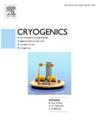A data-driven based concurrent coupling approach for cryogenic propellant tank long-term pressure control predictions
IF 2.1
3区 工程技术
Q3 PHYSICS, APPLIED
引用次数: 0
Abstract
The design and optimization of cryogenic propellant storage tanks for NASA’s future space missions require fast and accurate predictions of long-term fluid behaviors. Computational fluid dynamics (CFD) techniques are high-fidelity but computationally prohibitive. Coarse mesh nodal techniques are fast but heavily rely on empirical correlations to capture prominent three-dimensional phenomena. A data-driven based concurrent coupling (DCC) approach has been developed to integrate CFD with nodal techniques for efficient and accurate analysis. This concurrent coupling scheme generates case-specific correlations on the fly through a short period of co-solving CFD and nodal simulations, followed by a long-period nodal simulation with CFD-corrected solutions. This paper presents the approach development, stability analysis, and efficiency demonstration, specifically for modeling two-phase cryogenic propellant tank self-pressurization and periodic mixing phenomena. Linear regression is employed to derive the data-driven correlations. The self-pressurization experiments of Multipurpose Hydrogen Test Bed experiments and K-Site tank are used to validate the approach. The DCC approach accurately predicts temperature stratifications while reducing computational time by as much as 70% compared to pure CFD simulations. Additionally, the DCC approach mitigates the risks of numerical instability and correlation loss inherent in current domain decomposition or overlapping-based coupling methods, making it a flexible and user-friendly approach for integrated CFD and nodal analysis of cryogenic tank behaviors.
基于数据驱动的低温推进剂储罐长期压力控制预测并行耦合方法
为美国宇航局未来的太空任务设计和优化低温推进剂储罐需要对长期流体行为进行快速和准确的预测。计算流体动力学(CFD)技术是高保真的,但在计算上令人望而却步。粗网格节点技术速度快,但严重依赖于经验相关性来捕捉突出的三维现象。提出了一种基于数据驱动的并行耦合(DCC)方法,将CFD与节点技术相结合,实现高效、准确的分析。这种并发耦合方案通过短时间的CFD和节点模拟协同求解,然后使用CFD校正后的解决方案进行长时间的节点模拟,实时生成特定情况的相关性。本文介绍了该方法的发展、稳定性分析和有效性论证,特别是对两相低温推进剂储罐自增压和周期性混合现象的建模。采用线性回归来推导数据驱动的相关性。通过多用途氢气试验台的自增压实验和K-Site储罐的自增压实验对该方法进行了验证。与纯CFD模拟相比,DCC方法可以准确地预测温度分层,同时减少多达70%的计算时间。此外,DCC方法降低了当前区域分解或基于重叠的耦合方法固有的数值不稳定性和相关损失的风险,使其成为一种灵活且用户友好的方法,可用于低温储罐行为的集成CFD和节点分析。
本文章由计算机程序翻译,如有差异,请以英文原文为准。
求助全文
约1分钟内获得全文
求助全文
来源期刊

Cryogenics
物理-热力学
CiteScore
3.80
自引率
9.50%
发文量
0
审稿时长
2.1 months
期刊介绍:
Cryogenics is the world''s leading journal focusing on all aspects of cryoengineering and cryogenics. Papers published in Cryogenics cover a wide variety of subjects in low temperature engineering and research. Among the areas covered are:
- Applications of superconductivity: magnets, electronics, devices
- Superconductors and their properties
- Properties of materials: metals, alloys, composites, polymers, insulations
- New applications of cryogenic technology to processes, devices, machinery
- Refrigeration and liquefaction technology
- Thermodynamics
- Fluid properties and fluid mechanics
- Heat transfer
- Thermometry and measurement science
- Cryogenics in medicine
- Cryoelectronics
 求助内容:
求助内容: 应助结果提醒方式:
应助结果提醒方式:


